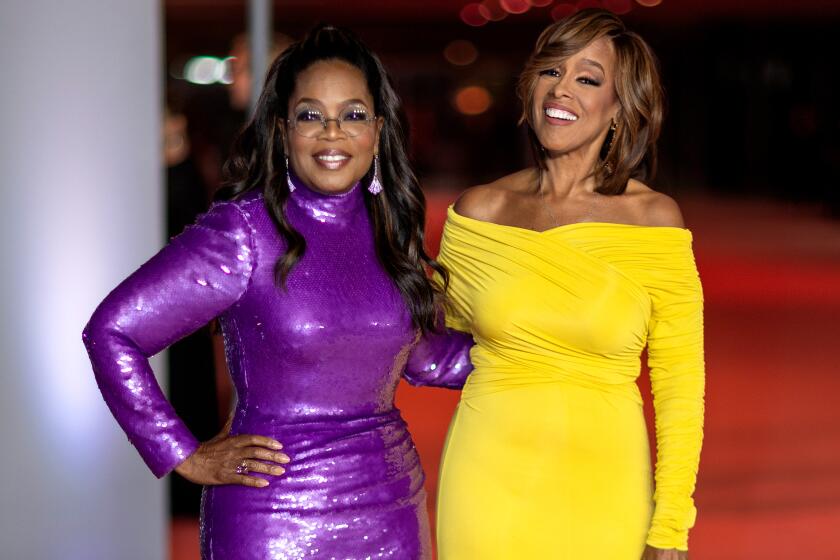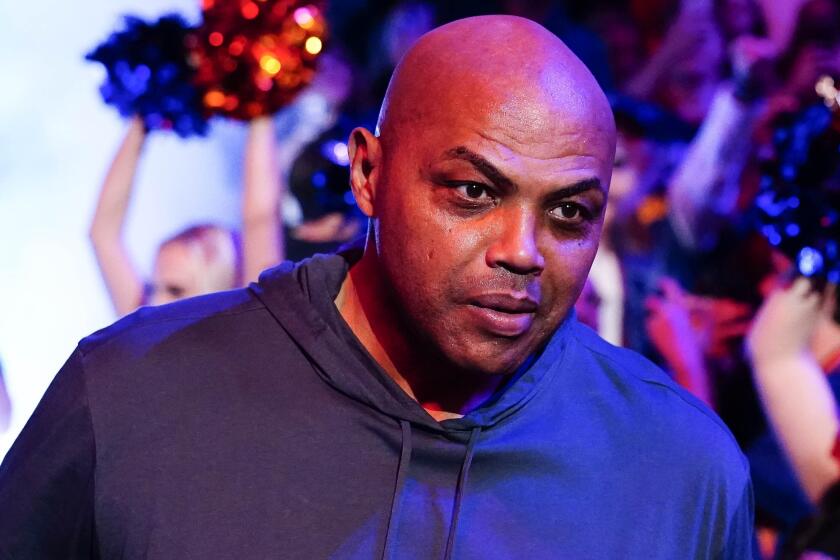Sitcom Caught in Conflict : The War in the Gulf Is Dictating Changes to ‘Major Dad’
What actress Shanna Reed’s character, Polly Cooper, will say to the audience Monday evening following the opening credits for “Major Dad” on CBS is anybody’s guess, including executive producer Rick Hawkins.
The war in the Persian Gulf has changed everything for the weekly sitcom about a U.S. Marine officer and his family. With six episodes to go this season, Hawkins and his staff have tossed out the scripts they were working on and are starting from scratch. Instead of the normal three-week production time, the cast and crew are turning around episodes in 10 days.
In the case of Monday night’s episode, the opening and closing won’t even be written until Monday morning.
“Polly will do a voiceover in the morning, so that the episode itself will appear to actually be taking place on Monday, with Polly remembering back to the day the war started two weeks earlier,” Hawkins said.
The fast-breaking changes in the Gulf obviously dictate network news programming on an hour-by-hour basis, but “Major Dad” may well be the first sitcom that has been similarly affected. Whatever happens in Saudi Arabia between now and Monday morning will determine what Hawkins will write and have Reed say for the voiceover taping.
“Then we’ll beam it to CBS for Monday night so that we have, at least with that particular episode, a way if necessary to accommodate any changes that happen in the war,” he said. “It’s the only way I could think of to do this.”
More than any other prime-time program, “Major Dad” cannot escape the conflict that is going on in the Middle East, although Hawkins, who wrote the script for Monday’s episode, resisted the inevitable to the very end.
“The only thing I was more afraid of than addressing the war issue on our show was not addressing it,” he said. “We have established a certain reality with these characters that I think has been accepted by our audience, so we had to address it.”
“Gomer Pyle USMC” never dealt with Vietnam, he acknowledged, but that was a different kind of sitcom. When comedy tries to address real issues, as “Major Dad” does, the issues sometimes impose themselves on the comedy itself.
A year ago, when Hawkins was planning the series’ second season, the United States was prosperous and at peace. The big news was glasnost , the collapse of communism in Eastern Europe and the destruction of the Berlin Wall. In order to create a little comic tension in such a euphoric peacetime atmosphere, the producers dispatched Maj. John D. MacGillis (Gerald McRaney), his wife and three stepdaughters to a Marine supply base in Virginia and turned the proud combat veteran into a paper-pushing “staff weenie,” as Hawkins puts it.
“We thought: Let’s take someone who has trained his whole life (to be a fighting man) and put him basically in a desk job,” he said. “We thought we could find a lot of humor in this element.”
Instead, what the producers unwittingly did was put their protagonist into one of the most demanding stateside jobs a Marine can have during times of war. For the remaining half-dozen episodes of “Major Dad,” MacGillis will be working endless hours supervising the re-equiping of troops in the Persian Gulf. And, said Hawkins, the “staff weenie” of peacetime will have to deal with the often unfunny ironies of a genuine blood-and-guts war.
To the comedy writers of “Major Dad,” that poses a major challenge.
“I’m very proud that this is a family show in the family hour (between 8 and 9 p.m.), so this is something I’m very nervous about,” Hawkins said. “There are a lot of people who want to protect their children from this (the war) and would prefer to see something that was more of a fantasy.”
Such is the experience of the other networks. After its own experience with preempting two episodes of its new Saturday night “Under Cover” drama because of Middle East references (see accompanying article), ABC has shied away from such references and plans none during the February sweeps, according to a network spokesman.
Likewise, NBC’s last reference to the Gulf during prime-time entertainment programming occurred three weeks ago, when a character from “A Different World” found himself dispatched to duty in Saudi Arabia--six days before the first bombing raid by allied jets over Baghdad. There are no further prime-time references expected any time soon, an NBC spokeswoman said.
At Fox, the “Comic Strip Live” series will begin featuring stand-up comics who incorporate war jokes into their routines, possibly as early as Sunday, but none of the network’s sitcoms or dramatic series plan to include war references this month.
CBS alone will be acknowledging the war during February sweeps, according to network spokesmen, either in full-blown story lines, such as that of “Major Dad,” or in occasional references, such as by the character of Charlene in “Designing Women,” whose husband was dispatched to the Gulf in an episode that aired late last year.
The grim prospect of body bags, land mines and Scud missiles is no laughing matter, Hawkins acknowledged, but there is humor to be found--even in the worst of circumstances.
He said that on the day the Persian Gulf War broke out, several Marines stationed at Camp Pendleton phoned an international operator and got through to a luxury hotel in Baghdad, asking for the reservations desk.
“They said, ‘We’d like to make reservations for 40,000 Marines. We’ll be there in two weeks,’ ” Hawkins recalled.
The Marines’ plans turned out to be a bit optimistic, but the story--relayed to Hawkins through a Marine Corps adviser to the Universal/MCA-produced series--is as true as the brand of humor he and his colleagues try to bring to the small screen each week. But humor is no longer their only objective.
The complete guide to home viewing
Get Screen Gab for everything about the TV shows and streaming movies everyone’s talking about.
You may occasionally receive promotional content from the Los Angeles Times.



